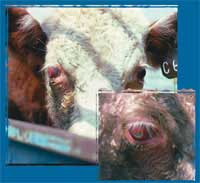Pinkeye: Avoid An Outbreak
A WORD FROM THE VETS...
 Pinkeye can quickly escalate to the biggest challenge for cow-calf herds during the summer. Calves and younger cattle are more susceptible because they have not developed immunity to Moraxella bovis, the primary infectious agent. Pinkeye is spread when an animal comes into contact with infected secretions of another. Pinkeye invasion peaks when eyes are irritated by flies, tall grass, dust and pollen, sunlight, nutritional distress and viral diseases (IBR and BVD). Face flies can harbor and transmit M. bovis for up to three days.
Pinkeye can quickly escalate to the biggest challenge for cow-calf herds during the summer. Calves and younger cattle are more susceptible because they have not developed immunity to Moraxella bovis, the primary infectious agent. Pinkeye is spread when an animal comes into contact with infected secretions of another. Pinkeye invasion peaks when eyes are irritated by flies, tall grass, dust and pollen, sunlight, nutritional distress and viral diseases (IBR and BVD). Face flies can harbor and transmit M. bovis for up to three days.
Pinkeye prevention is economical and typically much less time consuming than treatment. Vaccinate prior to pinkeye season for season-long protection in one dose. SolidBac Pinkeye IR/PR implants include both immediate and programmed release antigen pellets, for the equivalent of two doses of antigen in one application. While vaccine does not prevent all clinical cases, it can be of significant economic benefit in reducing morbidity. Because M. bovis transmission often involves flies, an intensive fly control program is essential.
Prompt treatment can help minimize an outbreak. M. bovis is usually susceptible to long-acting oxytetracycline. New Vetericyn Pink Eye Spray is sprayed directly into the eyes, and has been proven to kill M. bovis. As always, if you have questions about the health of your herd, we will do our best to help you find answers that make sense.
Arnold Nagely, DVM • Ray Shultz, DVM
Pre-season action can MINIMIZE PINKEYE challenge!
![]() I-Site XP Pinkeye
I-Site XP Pinkeye
![]() SolidBac Pinkeye IR/PR Implants
SolidBac Pinkeye IR/PR Implants
![]() Vetericyn Pink Eye Spray
Vetericyn Pink Eye Spray


